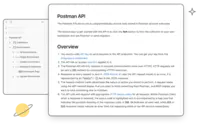Overview
What is Postman?
Postman, headquartered in San Francisco, offers their flagship API development and management free to small teams and independent developers. Higher tiers (Postman Pro and Postman Enterprise) support API management, as well as team collaboration, extended support and other advanced features.
all in one tool AKA Swiss army knife of API world
Time saver of engineers
Postman the all-around best and simplest to use API tool
Postman Review
Except Data Generator and Database connectivity, happy with Postman
A must-have tool for API development
All About Postman
Easy start with deeps and room for improvement
Postman, a solid addition to your toolbox
Any API request quick'n'easy
Postman - the API client you need.
Wonderful platform for providing API to customers
Postman - A Beautiful coded API Testing App.
Beginning your API journey with Postman
Postman Delivers
Awards
Products that are considered exceptional by their customers based on a variety of criteria win TrustRadius awards. Learn more about the types of TrustRadius awards to make the best purchase decision. More about TrustRadius Awards
Popular Features
- API access control (32)9.595%
- API monitoring and logging (32)8.888%
- API versioning (24)8.787%
- API user onboarding (21)8.383%
Reviewer Pros & Cons
Pricing
Postman Free Plan
$0.00 US Dollars
Postman Basic Plan
$12 US Dollars
Postman Professional Plan
$29 US Dollars
Entry-level set up fee?
- No setup fee
Offerings
- Free Trial
- Free/Freemium Version
- Premium Consulting/Integration Services
Features
API Management
API management handles technical things like user permissions, version control,and security, in addition to business items like documentation and pricing
- 9.5API access control(32) Ratings
Authentication and authorization systems to ensure that users of the API have permission
- 7.1Rate limits and usage policies(18) Ratings
Usage quotas to restrict traffic volumes to keep traffic loads manageable
- 8.1API usage data(17) Ratings
Analysis of traffic patterns to track how API is being used
- 8.3API user onboarding(21) Ratings
Systems to allow users to sign up, receive access credentials and be assigned usage rights
- 8.7API versioning(24) Ratings
There are mechanisms to roll out new versions of the API and the ability to migrate applications to new versions.
- 7.8Usage billing and payments(12) Ratings
Support for payment mechanisms such as monthly fees, or other payment patterns
- 8.8API monitoring and logging(32) Ratings
Regular test cycles to check that APIs are operating as expected and log analysis providing deeper analysis on system usage
Product Details
- About
- Integrations
- Competitors
- Tech Details
- FAQs
What is Postman?
Postman Features
API Management Features
- Supported: API access control
- Supported: API versioning
- Supported: Usage billing and payments
- Supported: API monitoring and logging
Postman Screenshots
Postman Video
Visit https://www.youtube.com/channel/UCocudCGVb3MmhWQ1aoIgUQw to watch Postman video.
Postman Technical Details
| Deployment Types | Software as a Service (SaaS), Cloud, or Web-Based |
|---|---|
| Operating Systems | Unspecified |
| Mobile Application | No |
Frequently Asked Questions
Comparisons
Compare with
Reviews and Ratings
(369)Community Insights
- Business Problems Solved
- Pros
- Cons
- Recommendations
Postman has gained popularity as a user-friendly API testing tool that supports the development, debugging, and publishing of APIs. Users from various departments, including QA, Dev, and IT monitoring, rely on Postman to test the behavior of services and measure their performance and response time. With support for different formats like JSON and XML, software developers use Postman to test and automate new APIs, streamlining their testing processes and improving work quality. Additionally, Postman is widely utilized for testing both public and private API systems, ensuring their reliability and functionality. It also facilitates communication with non-conventional clients who have their own custom API-consuming mechanisms. The tool's ability to create workspaces and save all requests helps enhance organization and efficiency. Moreover, Postman is highly valued for its simple and user-friendly UI, making it easy for users to make API calls and maintain their own workspace. Its history feature allows users to easily reuse their last used requests, while the ability to save request information locally and share it with colleagues promotes effective collaboration. Furthermore, Postman plays a crucial role in troubleshooting as it allows software engineers and development teams to connect to APIs and gather information. Users find its integration into the CI/CD pipeline particularly beneficial as it streamlines the development and deployment process. Additionally, Postman is commonly used by automation engineers for different types of testing such as regression testing, smoke testing, and functional testing. It simplifies API development tasks by assisting in managing existing APIs, creating new ones, and providing easy API documentation for clients. The fact that Postman is free to use is seen as a major advantage by users. Overall, Postman's speed, user-friendly interface, versatility in handling different formats, and integration into development processes make it a highly regarded API testing tool in the market.
Word Count: 300
Fast API calls: Many users have found the fast API calls feature to be very useful for HTTP protocol and restful service testing, with several reviewers mentioning its efficiency and time-saving capabilities.
Free and open-source tool: The fact that the software is a free and open-source tool has added to its appeal, as mentioned by multiple users. They appreciate the accessibility and affordability of the software.
Collaboration features: Several users have appreciated the ability to share API connections, create collections of API calls, and collaborate seamlessly with teammates. This universal feature of the software has been praised for enhancing teamwork and facilitating collaboration regardless of location.
Cumbersome User Interface: Some users have found the user interface of Postman to be overwhelming and complicated, making it difficult for new users to navigate. They suggested that the interface could be made cleaner and more intuitive, with a slim minimal version that only includes essential features.
Syncing and Loading Issues: Several users have experienced difficulties with syncing changes in Postman, often requiring them to restart the software. Additionally, loading collections in JSON format has been problematic for some users. These issues are further compounded when many tabs are open simultaneously.
Limited SOAP API Testing: Users have expressed a desire for improvements in testing SOAP APIs with Postman. They feel that there is room for enhancement in the area of testing WSDL as well. Some users find the software limited in its ability to efficiently tackle SOAK APIs and area testing.
Users highly recommend Postman for API development and testing, citing its cost effectiveness and history saving features. They suggest using Postman for backend development and testing APIs, as it allows for easy testing without waiting for the frontend. Users also recommend Postman for evaluating APIs and checking their functionality, as well as testing security features. Overall, Postman is considered one of the best tools for developers, API testing and management, organizations, and software developers.
Users find Postman easy to understand and use, making it a preferred choice for API documentation and sharing with teams. They highly recommend Postman for API testing, quickly testing server-side functional APIs, and for those developing web applications. Users suggest exploring all of Postman's features to meet all API testing and development requirements. Additionally, users think that Postman is the best API testing tool in the market.
While users generally recommend Postman for all types of projects, some caution that it may not scale well for larger projects. For smaller companies or individuals, however, Postman is highly recommended. For working on microservices with team collaboration, users suggest considering the Pro version of Postman. Users also recommend making extensive use of Postman for an easier workflow and treating it like a library or catalog of API requests. In summary, users consider Postman a must-have tool for any API developer or tester, particularly useful for developing CRUD applications as it simplifies and speeds up the process.
Attribute Ratings
Reviews
(1-5 of 5)Postman, a solid addition to your toolbox
- Simple and quick to create requests.
- Built in snippets for simple assertion generation.
- Externalizes parameters in environment files to allow simple swapping between development and test environments.
- The ability to integrate with a 3rd party source control system is frustrating. Needing to export a singular large raw file and store that in source control myself introduces a number of merge conflicts. Postman does offer their own source control system, but this does not allow me to parallelize my test code alongside my development code, and diverges from our development strategy.
- There [are] no elegant means of conditionally executing a particular step. Postman includes the ability to "go to" a request, but this requires looking deep into the implemented test or pre-request code to know that this behavior is present.
- There is no good solution to code reuse. I cannot define a particular request structure and parameterize it for future use. I am forced to replicate requests over and over and modify them all when changes are needed.
- relatively low barrier to entry
- free to use
- good option for developers to contribute to test automation initiatives
- API access control
- N/AN/A
- Rate limits and usage policies
- N/AN/A
- API usage data
- N/AN/A
- API user onboarding
- N/AN/A
- API versioning
- N/AN/A
- Usage billing and payments
- N/AN/A
- API monitoring and logging
- 70%7.0
- Allowed us to break ground on API automation testing.
- Allowed us to leverage developer resources for testing to compensate for the lack of QA resources
Any API request quick'n'easy
- Organize how to use an API
- Generate codes 'ready-to-use' for implementation
- Simulate API calls (for API development or test)
- Create process for data extraction via API
- Read paginated data
- Schedule requests
- Possibility to create many Workplaces
- Collections organization
- Environment variables
- API access control
- 90%9.0
- Rate limits and usage policies
- 100%10.0
- API usage data
- 80%8.0
- API user onboarding
- 90%9.0
- API versioning
- 90%9.0
- Usage billing and payments
- 90%9.0
- API monitoring and logging
- 80%8.0
- Quickly create API requests
- Analyse and Explore the data returned by any API
- Troubleshooting what's wrong with an API call from a code
Postman is the best utility to test APIs
- It allows us to share API calls.
- Easy to create test API calls.
- Easy to install.
- Easier to share to non-workspace users.
- API access control
- 100%10.0
- Rate limits and usage policies
- 80%8.0
- API usage data
- 40%4.0
- API user onboarding
- 60%6.0
- API versioning
- 80%8.0
- Usage billing and payments
- N/AN/A
- API monitoring and logging
- N/AN/A
- Postman has allowed me to test my own APIs very rapidly. I can create the API and test it without having to write client code to test it.
- Clear and concise interface for the 'entire' http request lifecycle.
- Lots of compatibility and support for various protocols, headers, request bodies, etc.
- Good team sharing ability if you use the paid version.
- The test runner, and the environment variable hosting is a HUGE time saver.
- The whole concept of 'collections', creating, saving, importing, exporting, is very well done.
- Sometimes the UI features that are cool are hard to find, hidden behind menus, etc.
- The test runner, while incredibly powerful, has some features in it (like saving variable outputs from one request, etc.) that are not obvious, and feel a little hacky to implement.
- The environment variable configuration is a huge time-saver but could be streamlined by having a better system of 'common' global vars, etc.
- API access control
- 100%10.0
- API user onboarding
- 90%9.0
- API versioning
- 90%9.0
- API monitoring and logging
- 90%9.0
- The ROI for team-sharing capabilities saves us at least hours a week, probably more.
- The ROI for public documentation makes it so our partner support emails have dropped in volume significantly.
- Without Postman, I'd have to write some sort of manual console-app-type test program for my API, which would be a huge pain, annoying to share, and would easily become unmaintainable.
- Easily configurable.
- Provides all the options that you need to test your API endpoint.
- The premium version could be used to test your production API endpoint health.
- Lack of 3rd party integration for monitoring and sending logs.
- The Chrome extension version is lackluster compared to the desktop version.
- Can be quite memory expensive
- API access control
- 100%10.0
- Rate limits and usage policies
- 90%9.0
- API usage data
- 80%8.0
- API user onboarding
- 100%10.0
- API versioning
- 50%5.0
- Usage billing and payments
- 50%5.0
- API monitoring and logging
- 100%10.0
- Saved us a lot of time developing API and debugging/testing.
- Could be used to monitor whether the API endpoint is healthy.
- Easily serves as an alarm whenever deployment to production has gone wrong by going through all API endpoint results.









